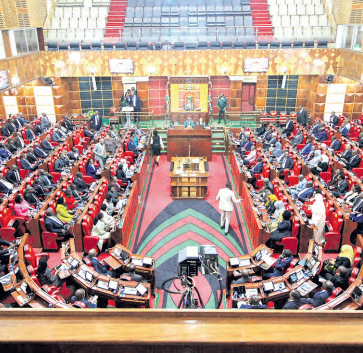
By EDWIN WANJAWA
Parliament voted on Tuesday night to allow the impeachment of sitting Deputy President Rigathi Gachagua. Two hundred eighty-one MPs voted for the impeachment versus 44 against it. I will not belabour the merits and demerits of the impeachment grounds.
Allow me, though, to comment on the theatre of the absurd that was the National Assembly. Save for a few contributions on the floor of the house, the National Assembly engaged in patterns of thinking and behaviour that are extremely closed and intolerant of difference and pluralism.
The inability of the parliamentarians to read the mood of the citizenry was telling.
Obviously MPs were not exercising their role as representatives of the people. It got me thinking. Why is it easy to get people to do the bidding of their leaders? How, for instance, was it possible for a sophisticated, educated population like Germany’s to follow blindly the dictates of a maniacal leader, and to revive memories of the horrors of the Nazi regime?
Can we really count on our Parliament to safeguard a pluralistic future from what appears to be the human tendency to get lost in a homogenized whole that must destroy human beings who are different, rather than engage them constructively?
Why do our MPs seem so eager to believe, to wrap themselves around an absurdity and fall lock-step in line with a black-and-white, simplistic belief system espoused by a strong leader?
What happened in Parliament on Tuesday was a government seeking compliance and the elimination of dissent from the population and creating conditions that affect the nature of the society’s discourse, and the psychology of the individual citizens.
Indeed, these impeachment conditions are being created whereby any form of dissent from the established government view is considered unpatriotic, no alternative perspectives are accepted, let alone encouraged. Discourse and collective thinking processes become simple, blinkered processes of conformity.
Our thinking and voting idiocy as shown in the impeachment of DP Gachagua is unparalleled. Members of Parliament oozed low-information deficit in their contributions on the floor of the house and obviously in their voting.
When most of them stood to speak, they showed a clear lack of understanding of how government works. Their contributions were bereft of ideology and akin to banter at the market place.
Studies have found that in the absence of other information, voters use candidates' physical attractiveness, race, ethnicity and gender to draw inferences about their personal qualities and political ideology. What are the consequences of a legislature that lacks political knowledge? What would happen if the Kenyan parliamentarian was more informed? The effects of political information on political behaviour hold crucial consequences for the quality of democratic representation.
Many MPs are uninformed about what the key issues are. This lack of information distorts their ability to make informed preferences, but more importantly translate them into pivotal policy choices.
The impeachment process reminds us that we live in a society with significant informational and representational inequalities. Not everyone is politically informed, and certain types of people are systematically more informed than others.
The net effect of these knowledge disparities within the electorate is that informed voters have an easier time translating their political preferences into a vote that best represents their interests.
Uninformed voters, by contrast, may make voting mistakes by not fully understanding the electoral choices on offer or how these choices relate to their interests and preferences. Besides, these informational imbalances engender political cues and aggregations that do not solve the problem of political ignorance within the citizenry.
Consequently, election results are biased against the interests of economically disadvantaged voters who tend to be the least informed within the electorate. Increased political information would lead to greater representation for these unheard voices and election results that reflect the preferences of the public.
Beginning with the Hobbesian emergence of the state, an informed electorate has been assumed to be necessary for a well-functioning democracy.
Thomas Jefferson believed, “Whenever the people are well-informed, they can be trusted with their own government.” However, “If a nation expects to be ignorant and free, in a state of civilization, it expects what never was and never will be.
Applying Jefferson’s standards of knowledge to today’s politics means that leaders and citizens have policy preferences, are informed about their electoral choices on offer, and successfully vote for the candidate and the issue that best represents these interests.
These standards as we know rarely attend Kenyan’s train of political thought. It clearly did not attend Tuesday’s impeachment party.
Edwin Wanjawa teaches at Pwani University and is a Programmes Associate at Development Through Media (DTM), a Media CSO
















